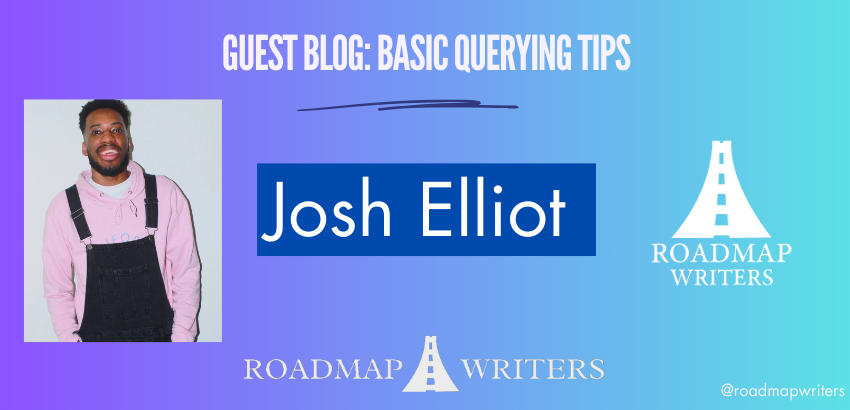
Roadmap Social Media Committee Member and Literary Assistant Josh Elliot outlines the best tips for querying producers and managers.
Querying is something no one wants to do. No one wants to send anyone annoying cold emails when it feels like you are a beggar throwing darts into a dart board abyss hoping something sticks. The reality is, screenwriters do occasionally get signed from query emails, and it is just one of the many ways you can help jumpstart your career.
The world of screenwriting is a subjective one and I by no means consider myself an expert, but as the literary assistant for a talent management company, I see more query emails on the daily than I do blades of grass (I work from home so there are days I don’t go outside). There are some tips I would like to share that could improve the queries screenwriters send. In my opinion, there are three basic steps to sending query emails. Research. Query. Follow-Up.
Research is a HUGE element to querying that many screenwriters skip. Before sending a query email, you need to know when you should query, and who you should query. Ask yourself are you ready to send a query email. Do you have at least one piece of material that has been well received by peers or industry members? If so, great! If not, still great! You just need to keep writing until you do. Roadmap Writers has many programs to help you get to this point. The last thing you want to do is query someone who does request to read your script but the script is not quite the quality it could be yet. You will have burned your read then. Once you have a script you are confident in, research who you should query. Do a deep dive on which managers, producers, agents, or executives you think would be a good fit for your script. If you are a comedy writer, you do not want to query a manager who mostly represents horror writers. If your script is a smaller budget one, you do not want to query a producer who produces blockbuster movies, etc. Once you have a good list of industry members whose work you believe aligns with yours, then you can start emailing!
The actual query email should be as simple as possible. As I mentioned before, managers, producers, agents etc get loads of query emails a day on top of all of the reading they have to do already. To start, DO NOT include your script in the query email. This is not a suggestion. Many managers have their emails set to send unknown emails with attachments straight to spam because they do not accept unsolicited material. So if you attach your script to the query email, there is a good chance it won’t be seen at all. Your subject line should include the title of your script at the very least. I think it is a good idea to include the genre, format, and a comp as well.
Example: JAWS DIES HARDER - Action Thriller Feature - Die Hard meets Jaws*

*Editor's Note: Now I really need to see a movie called JAWS DIE HARDER
This can help catch the eye of the industry member you are querying because it will show your great title along with a snippet of its potential.
Make sure to address whoever you are querying directly so you seem as personal as possible. Include the logline of your script in the body of the email. This very well may be the most important part of the query. Concept and premise is what grabs the attention of industry members the most in queries. If your premise is undeniable, original, and unique then you have multiplied your chances of them requesting to read it! DO NOT query more than one script in the email. Stick to the one you're most confident about.
Another key element to the body of a query is YOU. Tell them about yourself. Tell them how this script is special and unique in the way it connects to you. Tell them what’s in your DNA. Literally and figuratively. Literally in the ways of where you are from. What are you like? Are you BIPOC? WOC? AAPI? LGBTQ+? Neurodivergent? Figuratively in the way of your experiences. Your perspective. Your voice. Screenwriters including me hate to box themselves into a “brand” but it's something we just have to accept. This is the place in the query where you can explain your experiences and perspectives in life and what makes not only you, but this script special.
Somewhere in the body of the email, you should also weigh in to why you are querying this particular person. Were you referred by someone they know? Does your work align with their clients/credits? Did you meet them at an event or maybe even online through social media? Including how you connect with this industry person will hold weight in the query.
It is a good idea to close the query email by thanking them for their time. They took the time to read a stranger’s email, so regardless of the outcome, this is a win! You should also include your contact information so if this person does want to read your script and for some reason cannot just hit the “reply” button, they will not have to search for your contact information.
One more piece of my advice that no one asked for is to make this entire email in your own voice. Just like your script, your personality and style should jump off the page in this query. If you are a comedy writer, make them laugh. If you are a drama writer, make them cry (kidding). But this person you are querying should feel like they know you after this email. A tall task to do in a short space, but you are a writer. You are built for this.
The last part of the query process is the follow-up! Generally I think a few weeks is a good time to let the query email breathe and give the person you are querying a chance to look at it. Take the time after those few weeks to send ONE AND ONLY ONE follow up email to give a respectful and gentle nudge. This can either remind them to respond to the query if they are interested, or give them another chance at seeing it the first time. What you do not want is to be the person who sends a different query in the follow-up or spam them with multiple follow-ups. I hope some of this helps you in your journey. Query away, scribes!
Josh Elliot is a black writer from Austin Texas, now residing in Los Angeles. Josh spent the last 3 years working as an assistant in the film industry where his writing placed highly in screenwriting competitions. As a kid, Josh was moved from a black neighborhood to an all white one, resulting in him often being the only black person in the room growing up. He uses this experience along with his bachelor’s degree in film to write comedy and drama that showcase the wide range of funny and painful stories that come with being black in America.